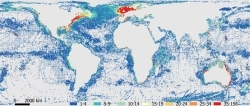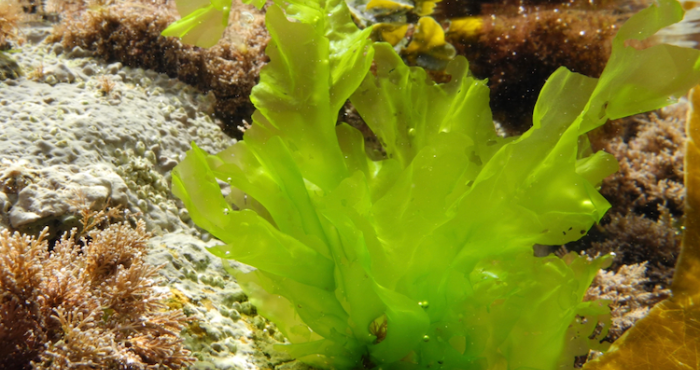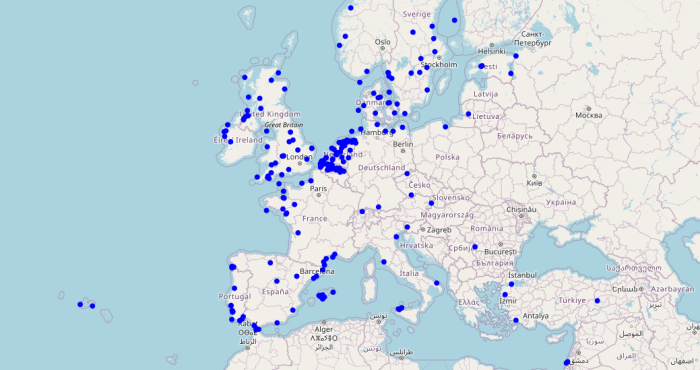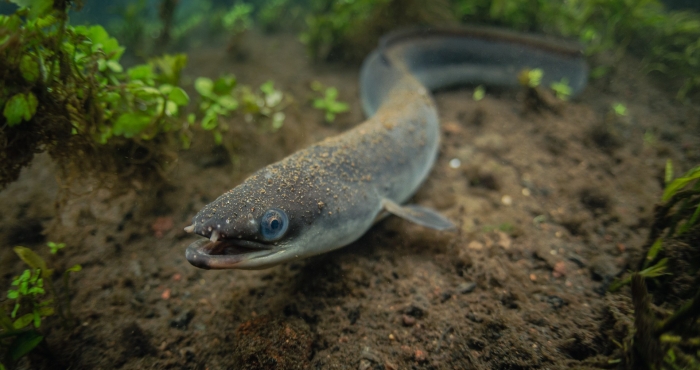Final stage of large research effort linked to LifeWatch data infrastructure
On Monday June 19th Samuel Bosch will publicly defend his doctoral thesis entitled: "Marine species distributions: from data to predictive models". The defense will take place at 4 PM, Auditorium Valère Billiet, Krijgslaan 281 S8, 9000 Ghent. Promoter of this PhD is Prof. Dr. Olivier Declerck from Ghent University. Parts of this thesis were conducted in close collaboration with the VLIZ data center division and supported by LifeWatch.

Samuel his study aims to improve and contribute to the process and understanding of marine species distribution modelling in order to facilitate an in depth study of the trends, vectors and distribution of introduced seaweeds in Europe. Here, we summarize and highlight some parts of his work.
The first part of the thesis deals with general aspects of marine species distributions, the environmental data used for modelling and the relevance of marine predictors of species distributions.
QC flags
In order to provide quality indicators for the marine species distribution data available in the European and international Ocean Biogeographic Information Systems (EurOBIS and OBIS), different steps were developed to analyse the quality and completeness of the distribution records. The corresponding quality control (QC) flags not only help users with their data selection, they also help the data management team and the data custodians to identify possible gaps and errors in the submitted data. More information you can find in the corresponding paper.
Sdmpredictors
In another chapter the open source R package ‘sdmpredictors’ is presented. This package allows the end user to download terrestrial and marine environmental layers for the past, current and future climates. sdmpredictors contains metadata, statistics and pairwise correlations for the available datasets and layers. These correlations between predictors can be subsequently grouped and plotted. The package now contains data from WorldClim, ENVIREM, Bio-ORACLE and MARSPEC.
Marinespeed
The Marinespeed dataset is one of the major research outcomes of this thesis. It is a standardized benchmark dataset for methodological species distribution modeling studies. For MarineSPEED, well studied and identifiable species were selected from all major marine taxonomic groups. Distribution records were compiled from public sources (e.g. OBIS, GBIF, Reef Life Survey) and linked to environmental data from Bio-ORACLE and MARSPEC. All of these data (514 species and 2 million distribution records with environmental info) are made available through the open source R package marinespeed, at http://marinespeed.org and through the LifeWatch Marine Virtual Research Environment (Marine VRE). Using this dataset, predictor relevance was analysed under different variations of modelling algorithms, numbers of predictor variables, cross-validation strategies, sampling bias mitigation methods, evaluation methods and ranking methods.
The second part of the thesis contains three chapters which present case studies related to the introduction of seaweeds in Europe. These are specifically about the history and trends of these introduced species, about the risk of aquarium trade as a vector for future introductions of seaweeds and about the ability of species distribution modelling to predict the introduction and spread of introduced seaweeds where a method is presented for identifying candidate areas for further spreading under climate change.
The first part of the thesis deals with general aspects of marine species distributions, the environmental data used for modelling and the relevance of marine predictors of species distributions.
QC flags
In order to provide quality indicators for the marine species distribution data available in the European and international Ocean Biogeographic Information Systems (EurOBIS and OBIS), different steps were developed to analyse the quality and completeness of the distribution records. The corresponding quality control (QC) flags not only help users with their data selection, they also help the data management team and the data custodians to identify possible gaps and errors in the submitted data. More information you can find in the corresponding paper.
Sdmpredictors
In another chapter the open source R package ‘sdmpredictors’ is presented. This package allows the end user to download terrestrial and marine environmental layers for the past, current and future climates. sdmpredictors contains metadata, statistics and pairwise correlations for the available datasets and layers. These correlations between predictors can be subsequently grouped and plotted. The package now contains data from WorldClim, ENVIREM, Bio-ORACLE and MARSPEC.
Marinespeed
The Marinespeed dataset is one of the major research outcomes of this thesis. It is a standardized benchmark dataset for methodological species distribution modeling studies. For MarineSPEED, well studied and identifiable species were selected from all major marine taxonomic groups. Distribution records were compiled from public sources (e.g. OBIS, GBIF, Reef Life Survey) and linked to environmental data from Bio-ORACLE and MARSPEC. All of these data (514 species and 2 million distribution records with environmental info) are made available through the open source R package marinespeed, at http://marinespeed.org and through the LifeWatch Marine Virtual Research Environment (Marine VRE). Using this dataset, predictor relevance was analysed under different variations of modelling algorithms, numbers of predictor variables, cross-validation strategies, sampling bias mitigation methods, evaluation methods and ranking methods.
The second part of the thesis contains three chapters which present case studies related to the introduction of seaweeds in Europe. These are specifically about the history and trends of these introduced species, about the risk of aquarium trade as a vector for future introductions of seaweeds and about the ability of species distribution modelling to predict the introduction and spread of introduced seaweeds where a method is presented for identifying candidate areas for further spreading under climate change.



